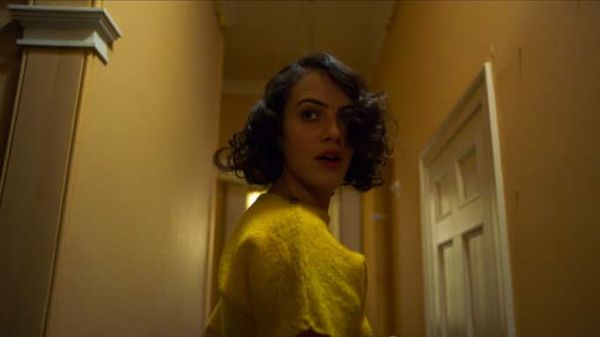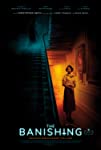Eye For Film >> Movies >> The Banishing (2020) Film Review
The Banishing
Reviewed by: Jennie Kermode

It's 1938 and Europe is on the brink of war. In Britain, the remains of much older conflicts are being played out through less obvious but still violent means, often on the bodies of women. Marianne (Jessica Brown Findlay) is a well spoken, respectably dressed young woman with an 11-year-old daughter, Adelaide (Anya McKenna-Bruce), and a prim, nervous vicar husband, Linus (John Heffernan). All is not well in her marriage, however, and both she and Linus have secrets in their past. What's more, so does the house where they have been sent to live - and the two might be connected.
The occult was a huge fad in that particular decade, and particularly popular with the Nazis, who hoped to find ways of weaponising it. This context adds an extra layer of creepiness to Christopher Smith's film, which otherwise relies heavily on familiar tropes like shadowy corridors, sinister hooded figures and a disintegrating china-faced doll which Adelaide takes a shine to. Marianne soon comes to find the girl's play disturbing as she seems more interested in invisible friends than in her family. Linus and the bishop he answers to (John Lynch) seem more focused on her mental health, and there's a hefty dose of gaslighting as you'd expect in a female-led horror film set in this period. It's Linus, however, who really seems to be having problems. His frigidity and religiously-inspired self harm may be a longstanding issue, but bouts of jealousy and aggression point to something new and become all the more worrying as we learn more about Marianne's social precarity.

Although there is no bar for Marianne to walk into and find all the customers falling silent, she encounters plenty of similar behaviour from the locals, with even a doctor changing his attitude abruptly when he learns where she's living. All this might sound rather overblown but Smith maintains a steady pace and there's a quietness to his approach which gives the ghostly aspects of the story room to breathe, As in most good ghost stories, there's a mystery underneath, but there's also an additional layer of manipulation, signposted at the end for those who missed it, which changes the tone of the story's conclusion.
McKenna-Bruce is good in a role that first requires her to restrain her emotions and then pulls her in several directions at once. Her fragility hints at prolonged trauma long before the story addresses it, but is never confused with a lack of courage or will, and the depth and consistency of the character make it possible to keep believing in her even as we discover that she isn't quite what we (or she) thought.
There's a strong feminist concern at the heart of the film, addressing issues which span generations and go hand in hand with a critique of certain attitudes and behaviours within the Church, whilst the presence of Sean Harris as a local man fascinated by the occult is not only a useful plot device but references the ancient tensions between Christianity and earlier religions which is echoed in attitudes to Marianne's sexuality. Together with the background of impending war and some nice costume work, this creates a strong period atmosphere whilst remaining pertinent to more recent issues. Although the central story never really comes alive in the way one might hope, there's a good deal of potential in it, and fans of traditional haunted house tales will find it a welcome change of pace.
Reviewed on: 25 Mar 2021
















